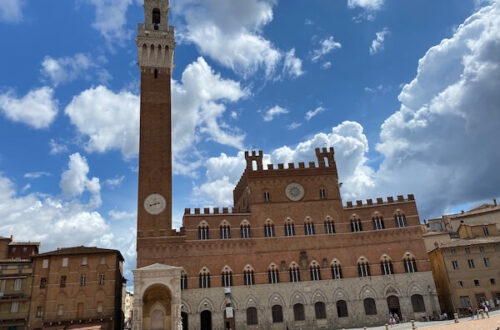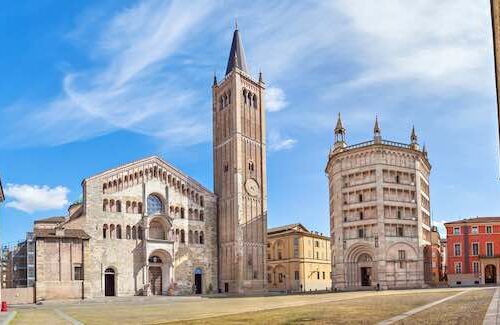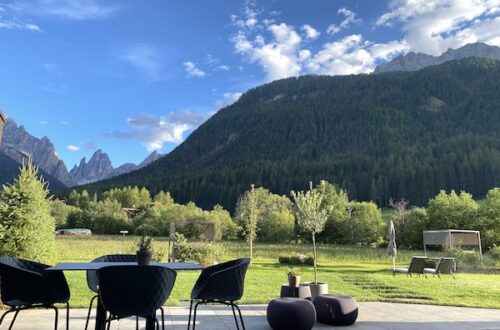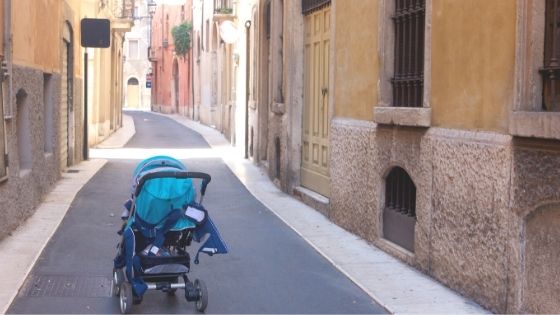
Using baby strollers in Italy: all you need to know + best buys
Using baby strollers in Italy: all you need to know and the best travel strollers for Italy to tackle cobbled streets and busy attractions.
One of the most common questions I receive about traveling around Italy with a baby or toddler is: shall I bring a stroller?
The question is valid.
Italy is well known for having cobbled streets and uneven terrain, and there is no doubt that, in some areas, baby carriers are better than strollers, at least for some of the time.
However, this is only part of the equations in the stroller vs no stroller debate.
The other part is that in Italy, you will walk a lot, and having the option to put your child down will be priceless for them and you.
I have two children and, regarding Italy travel, I am very much team stroller!
I still remember the vacation we took with two kids under three without a pushchair: I had decided that they were old enough to walk it all and I tell you: I lived to regret it!
The children had none of it, and no amount of gelato and stops made it any better.
My husband did most of the carrying, but it was very tiring overall.
He was always on carrying duty, I was always on ‘loose sibling’ duty, we couldn’t move our luggage as easily, and we ended up exhausted!
So, in my experience, having a stroller in Italy is better than not having one and I mean: any stroller.
You don’t need to buy a new fancy one for the trip, but I believe you need one!
In this post, I am sharing my experience and why I recommend bringing a stroller and stroller types that work for Italy should you be searching for a new one.
Please note: We do not receive any compensation nor incentive for including brands and pay for all our purchases. These recommendations come from our own experience and the recommendations of parents in our travel forum Travel Italy with kids on Facebook.
The best strollers for Italy – brands and models that worked for parents at a glance
To give you a full and always up-to-date list of good strollers for Italy, I periodically chat with parents on Italian vacations.
This way, you can be sure that the suggestions I give are current and based on real experiences.
The strollers for Italy with the most positive reviews are:
| Name / model | Best for |
| Maclaren Quest | All – an oldie but a goodie! If you can get it, we used it on ALL travels and loved it! |
| Baby Jogger City Mini | All |
| Baby Jogger City Select | one of the best double strollers for Italy |
| Zoe | All |
| GB Pockit | Train travel / frequent use of public transport |
| Zoe Twin | Double stroller |
City Mini
The City Mini is the stroller with the highest number of positive reviews in our Italy with kids travel group as it strikes a great balance between portability and sturdiness.
I personally love it: compared with models with smaller wheels, the City Mini offers a much smoother ride. I also find that a sturdy model such as this one is easier on my back as it cushions cobbles not just for my children riding on it, but also on my back!
I am not the only one with a positive opinion of it.
Many other parents said that the City Mini ‘did great everywhere’ and it was ‘perfect’.
Baby Jogger City Select – best double stroller for Italy
The baby jogger city select comes in single and double form and it’s another favorite.
The City Select works well in both types but I am particularly fond of their double stroller model because it can handle one potentially tricky Italian situation: narrow spaces!
While it is not impossible to navigate Italy with a side-by-side stroller, an inline double one will save you lots of headaches.
This is os also good for cobbles and has the added advantage of being quite versatile: as well as single or double, you can also attach a buggy board to it, should you have an older kid who may want to occasionally hop on for a ride.
Zoe stroller
The Zoe is another great lightweight stroller for Italy, striking a good balance between portability and comfort.
You can easily maneuver it with one hand, it folds easy, it is easy to carry and does well on the cobbles. This is a great stroller for travel but also a great pushchair for every day: if you are on the hunt for a new stroller, this is a great all-around choice.
GB Pockit
The GB picking works surprisingly well in Italy. Despite its small wheels, the GB picking fares well on cobbles and the fact that it folds well and is easy to carry is a definite plus.
Like all strollers with small wheels, it will be a bumpy ride in some cases and will work better with smaller kids – however, if this is the stroller you have, you’ll be happy to hear that many parents said it ‘did amazingly well on cobbles’, ‘did absolutely fine’ and ‘worked even better than our big stroller.
The GB Pockit is particularly suited to families who plan on using trains and public transport as it is very easy to fold and carry.
Zoe Twin
Double strollers tend to be tricky in many places in Italy; however, the Zoe Twin is one of the better ones for maneuverability and overall ease of use.
A friend recently returned from a trip to Rome and the South of Italy with it and recommended it specifically for its extended sun shades, ability to recline the seats for naps, and good storage space for changing bags and mats.
A few notes about strollers in Italy: what to consider
When trying to decide whether or not to bring a stroller on your Italian vacation, I suggest you consider the following:
- Many places in Italy are stroller friendly.
The first thing to consider when thinking of pushchairs in Italy, is that there is no such thing as ‘Italy’.
Italy may seem like a small country but it is varied and what is true in one place is not true in the next.
For one small town made of steps and meandering cobbled alleys, there are many more that are perfectly ok with strollers.
Italy is big and varied, so don’t believe generalizations: where you are in Italy is key to making an informed decision.
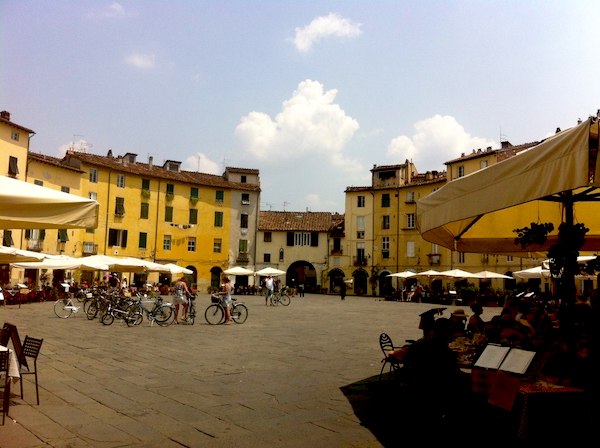
- Even stroller-unfriendly areas may have stroller-friendly parts.
Rome is the perfect example: while there are some challenges to strollers (potholes, cars parked everywhere etc), the city has large flat parts that are absolutely ok for strollers and won’t pose any difficulty.
- Stroller unfriendly can mean different things to different people
Stroller unfriendly doesn’t always mean inaccessible with a stroller.
Depending on where you are, stroller unfriendly may mean you cannot use one at all (the vertical steps of Positano are good examples) or it may mean the ride is a little bit bumpy because of the cobbles, or it may even mean you can use the strollers most of the time but you need to lift it every now and then (like in Venice with the bridges)
When hearing that a place is stroller unfriendly, always ask what it actually means so you can make an informed decision.
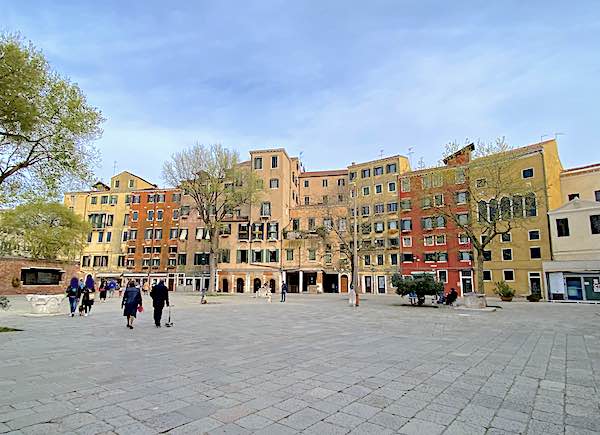
- Consider your comfort
Another big reason why I recommend bringing a stroller is being able to put your child down occasionally.
If you have a stroller, you can have them have a nap while you have a meal without having a kid literally on you all the time.
Or you may try on clothing in a local shop on the spur of the moment without having to maneuver your baby out of the carrier first.
My tip: Having a stroller gives you options. So, if you can, I highly recommend you bring both pushchair and carrier with you, picking one or the other each day depending on your exact plans.
- Consider long walks
The right stroller will be invaluable on long walks (you are pretty much guaranteed to walk A LOT in Italy!).
All this standing, however, there is no doubt that some strollers in Italy work better than others.
All you need to know about using baby strollers in Italy
In this post, we are going to look at:
- Strollers in Italy: specs you need
- Using strollers in Italy’s museums, trains and attractions
- Italian stroller brands you may like
The best stroller for Italy is compact
While traveling in Italy, you will find yourself folding the stroller often.
You will fold it to get on and off train and public transport, in restaurants, and in most museums; you will also often want to fold it and carry it when the steps and terrain get too uneven or turn into steps like in Taormina, Cinque Terre and Amalfi Coast.
A stroller that can easily be collapsed and set aside in these cases is ideal.
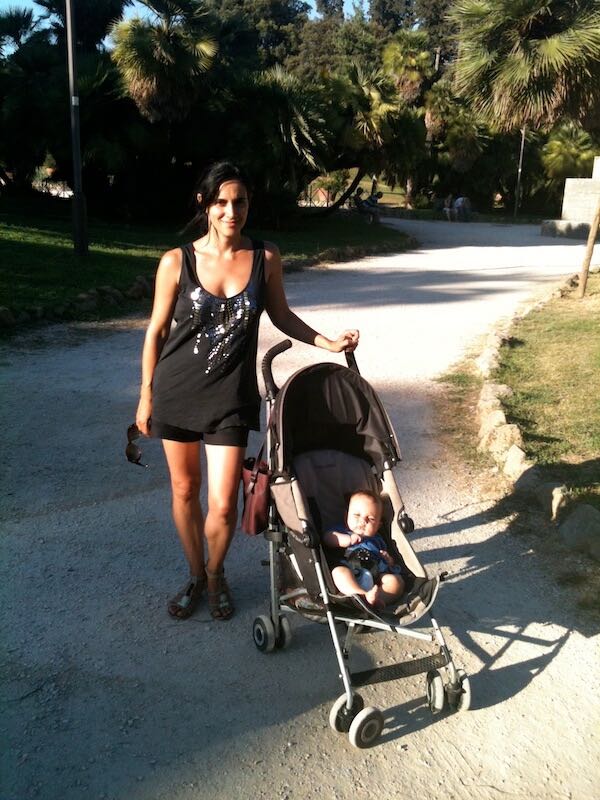
Good to know: while compact strollers are great, make sure they do not compromise the quality of the wheels in the name of size. Good wheels are essential to protect you and your baby from bumps on the road and cobbled street have quite a record for bending wheels and making cheap light strollers snap!
All terrain strollers are a great option too
An all-terrain stroller may not come to mind as the first option for travel as they are often bigger and heavier than umbrella ones, however, they can be excellent strollers for Italy.
They are essential for hikes in nature for instance on the Dolomites and we also found them excellent in Rome and in archaeological sites like Paestum or Ostia Antica.
Great all terrain strollers to consider are:
- Phil& Teds available as a single or a double
- BOB gear all terrain jogging stroller
- Joovy Zoom ultralight jogging stroller
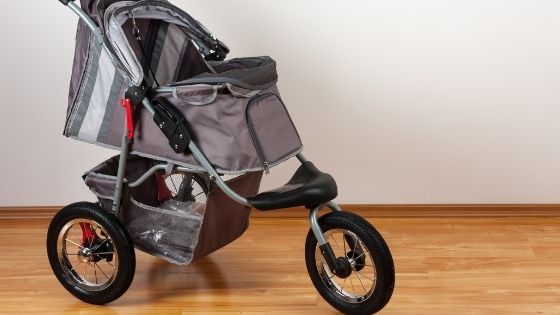
Strollers are allowed in many attractions
This may come as a surprise to many but many of Italy’s main attractions do accommodate strollers.
Bay strollers and pushchairs are allowed at:
- Rome Colosseum – ramps and lifts to most areas
- Rome Roman Forum – accessible path
- Vatican City, including Museum – ramps and lifts
- Pompeii – outdoor, all terrain wheels are best
- Uffizi Gallery – ramps and lifts albeit a carrier is better due to the layout and peculiarities of the building
Good to know: in most cases these attractions require the stroller to pass security checks and to stay open during the visit.
Strollers must be folded on public transport (often)
Public transport has different costs and rules in different cities and in many case it is a good option for parents since young children ride free,
However, it is important to know that in many places such as Rome, strollers can only board a bus if folded, which is an issue if you are hoping to board with a sleeping baby (how much the rule is enforced, however, varies)
Bringing a stroller on Italian trains
The type of storage space you get on a train depends largely on the type of train you get (regional, high speed, Italo etc)
In most cases, strollers must be folded on trains and kept either on the overhead luggage racks or with the large luggage at the ends of the carriage, when available.
Good to know! On FrecciaRossa high-speed trains you can select the ‘family seat’. this is a single seat with space for an open stroller beside it – very handy especially if traveling alone with a little one!
How stroller friendly are Italy’s top destinations
Italy is so big and varied it is impossible to make a full list of areas that are stroller-friendly and stroller unfriendly.
This is an overview of the most popular places for families in Italy and how they do stroller-wise!
Rome – A lot more stroller friendly than its cobbled may suggest, Rome will have you deal some uneven terrain, cars parked on sidewalks and some crowded areas. However, it is so big a stroller is a must. Opt for good wheels and be prepared to fold it often. Many attractions, including the Colosseum, are stroller-friendly. Read our tips for visiting Rome with a toddler here
Venice – mostly stroller friendly with the exception of its many bridges. Overall, a stroller here is a good idea as you will cover long distances on foot however, you will have to fold / lift the stroller on most of its bridges. If only staying a day, a carrier is a better option: if staying longer of you have a runner, a stroller is the way to go, despite the annoyance of the bridges. Read all about visiting Venice with kids here
Florence – some bumpy roads but overall ok with strollers. Bring a carrier for the Uffizi (much easier without a stroller) and for the climb up Piazzale Michelangelo. Read our guide to Florence with kids here
Cinque Terre – One of the hardest places for a stroller, with the notable exception of Monterosso, which has some flat parts. If coming for a day, plan on using a carrier instead.
Amalfi Coast – mostly stroller unfriendly, with the exception of Maiori, which has a rather flat center, and Sorrento city center. To explore, a carrier is the best option.
Dolomites – all terrain stroller and carriers are a must for hikes.
Tuscany hilltop villages – some are reasonably flat and some are pretty steep (Montepulciano comes to mind as a pretty steep one I would not want to tackle with a stroller!). Other places such as Lucca are perfect with strollers: in Tuscany, where you are will make all the difference!
Many villages are car free so if you have a walking child, they may be happy to tot around and the stroller is not needed. Read our guide to Tuscany with kids here
Renting a stroller in Italy
If you don’t want to travel with your own stroller, there are some services that offer rental.
Babonbo.com (several locations) renting strollers but also car seats and baby essentials such as monitors as well as toys
KidsinSicily.it – baby gear rental for families holidaying in Sicily
Italian stroller brands
if you are thinking of buying a stroller in Italy, these are Italian stroller brands to consider:
In Italian: stroller/pushchair = passeggino; pram=carrozzina
Peg Perego – several models, baby gear brand
Chicco – several models, baby gear toys brand
Brevi Passeggini – several models single and double
Cam – lightweight, compact strollers
FoppaPedretti – strollers, baby gear and more
Inglesina – strollers and baby gear
Momon – buggies and strollers
I hope you found this overview useful and it helped you decide whether to use a stroller in Italy and which one to bring. Safe travel planning!


